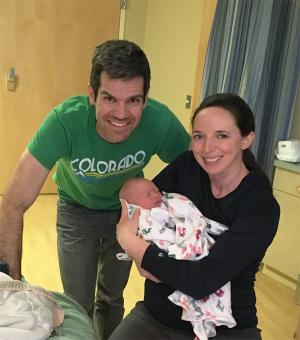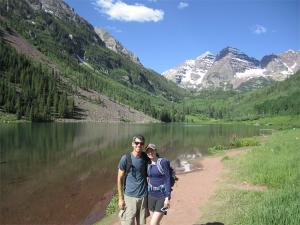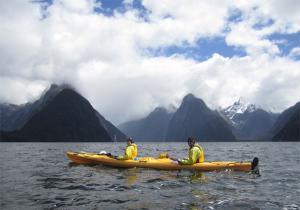Five questions for Patrick McGuire

Academia provides Patrick McGuire with a good work-life balance, allowing him to devote time to research, teaching and service. That balance is especially important now because McGuire recently became a father.
Declan Thomas McGuire was born at 8:43 p.m. March 3.
“Having an infant has truly been life-changing!” he said. (He answered emails at 3 a.m. one day.) “My wife, Jayme, and I are simultaneously thrilled and terrified to be new parents. This is our first child so we have a lot to learn about parenting. However, we are truly excited and blessed to begin raising our son in Colorado.”
McGuire is an assistant professor of teaching and learning in the College of Education at the University of Colorado Colorado Springs. Since 2012, he has been co-director of the UCCSTeach Program, a secondary mathematics and science teacher preparation program based on the national UTeach model.
After graduating from Duquesne University in Pittsburgh with degrees in mathematics and secondary education in 2004, he taught high school math. During one summer, he worked part-time as a research assistant at Carnegie Mellon’s Human-Computer Interaction Institute, developing content for an intelligent tutoring system project, ASSISTments. He said that working with a group of extraordinarily intelligent faculty members and graduate students inspired him to pursue his doctorate at the University of Virginia.
In the fall of 2010, he came to UCCS.
“I was drawn to the UCCS College of Education due to unbelievably welcoming colleagues. Many of the faculty members, staff and students I met went out of their way to make me feel like a part of the campus community. I knew it was the right fit,” he said. He also was confident that UCCS would offer the healthy work-life balance that he wanted: “Colorado is a pretty sweet place to call home!”
McGuire said the growth potential of the campus also attracted him.
“I could almost feel the growth happening during my campus visit,” he said. “The energy was contagious. Over the past five years, I have witnessed the development both in terms of increased student enrollment, new programs and, of course, the physical growth evidenced by campus construction. I wanted to be a part of a growing campus community and felt I was joining the campus at a very opportune time.”
1. Some of your research focuses on pre-kindergarten education. What have you found out about teaching math and science in the classroom and can parents apply the same ideas at home? What are you currently researching?
As a graduate student at the University of Virginia, I had the honor of working on a Department of Education-funded grant, MyTeachingPartner Math/Science (MTP-M/S), for three years. Through this work we developed curricula and teacher supports for at-risk, pre-kindergarten (pre-K) classrooms. We discovered, as previous researchers have, that a substantial number of pre-K teachers do not feel as comfortable and confident teaching math or science. As a consequence, much of their instruction has tended to gravitate more toward language and literacy concepts. When math concepts were introduced, they revolved around basic ideas such as oral counting or shape recognition. While these concepts are critically important to a child’s development, we discovered that through guided-inquiry, pre-K children have an innate desire to explore, learn and understand more challenging math and science.
One of the primary goals of our curricular development was to provide students and teachers with comfortable points of entry. Many times this involved math or science-based book readings, concrete manipulatives, or play-based center interactions. We used the real world to “hook” students with fun and engaging explorations and then supported the teachers in their ability to provide relevant and substantive follow-up discussions in the classroom. We also empowered teachers to find teachable math and science throughout their day. In other words, math and science learning was no longer limited to their prescribed lessons, but was found during snack time, on the playground, or in transitions. By slowly redefining when, where and how math and science occurred throughout the school day, teachers and students began to see how these concepts could be explored in a more naturalistic way.
Parents can absolutely support math and/or science development at home, even if they do not consider themselves to be “math” or “science” people. Similar to our approach with teachers, parents should look for teachable math and science moments throughout the day. This can involve sports, games, cars, technology, etc., to build upon children’s natural inquiries or experiments! Another excellent way for parents to supplement their children’s development is by reading math- or science-related books. Book readings can provide a comfortable point of entry to introduce children to math or science concepts, but also expands language development, so this is a win-win approach. Some of my favorite math-related book readings are “Anno's Counting Book,” “One Duck Stuck” and “Shapes, Shapes, Shapes.”
My current research involves teacher-student interactions. More specifically, I am interested in exploring the characteristics and behaviors of “super” teachers, and how these can be best developed with pre-service teacher candidates. There is a significant body of research in this area with in-service teachers and many models of teaching quality already established. However, there is still more work to be done that explores how these models can be implemented in pre-service programs.
2. Why is it important to begin a science/math education early and how would you address critics who say children should be allowed to play/explore in less structured ways?
An increasing body of research suggests that early mathematics skills are one of the most significant predictors of later success in school and life. The early years (birth to 8) serve as the most formative in terms of one’s cognitive and social development. Related research suggests that children who enter kindergarten significantly behind their peers tend to stay behind throughout the remainder of their lives. Therefore it is critical to capitalize on these early learning opportunities and provide children with an environment in which they can be successful.
My philosophy of early mathematics and science learning is one predicated upon the key takeaways of our MTP-M/S project. As a result of this project we continue to advocate for a balance of guided inquiry. In other words, there should be a blend of student-initiated exploration and teacher-guided learning. We feel this approach provides the best of both worlds because it allows children to be children but also allows adults to supplement a child’s understanding, build language and conceptual development, and ward off misconceptions.
3. How has the UCCSTeach program evolved since its inception in 2010?
The UCCSTeach program has grown to include approximately 125 undergraduate and post-baccalaureate teacher candidates. Our collaborative program works together with the College of Education, College of Letters, Arts and Science, and the College of Engineering and Applied Sciences with the primary goal of producing more highly qualified STEM teachers. Undergraduates can major in one of six degree plans (mathematics, biology, biochemistry, chemistry, physics, or engineering education) while completing our program. Upon completion of their degree and the 32-credit hour UCCSTeach program, teacher candidates are qualified to teach secondary math and/or science.
In addition to our primary goal of producing more highly qualified STEM teachers (we have 33 program alumni to date since 2013), we aspire to produce graduates who embrace an inquiry-based instructional approach to math or science. We challenge our teacher candidates to think differently, and eventually, teach differently in their schools. Our hope is that UCCSTeach graduates hit the ground running ready to serve as agents of change in their schools to make a difference in their students’ lives. I should note that I work with a fantastic group of colleagues in the UCCSTeach program. We are all dedicated to achieving this noble goal and really feel like we are starting to make a difference in the Pikes Peak region and beyond.
4. The number of young people choosing teaching as a profession is declining, perhaps because of salaries, mandated testing or political issues. What can be done to elevate the profession?
There is no doubt we are in a “recession” in terms of the number of people choosing to enter the teaching profession. This is a national issue, one in which Colorado is not immune. In fact, relatively recent statistics released by the Colorado Department of Education have indicated a dire need for highly qualified teachers across the state, particularly in rural districts. Math, science and special education teachers are most in demand.
Like most complex problems there is no single factor that explains the decline. It is some combination of all of the factors you mentioned. The political landscape in the last few years has not been conducive to supporting in-service teachers and encouraging pre-service teachers to pursue teaching as a career. Several poorly funded mandates have put more on teachers’ plates without removing things, resulting in increased pressure and stress. Relatedly low salaries may be a particularly noteworthy factor, especially for STEM teachers. On the open market, a STEM graduate can demand a significantly higher salary than a first-year teacher whose average salary is in the $35,000 range. This makes it difficult for one to justify a career in teaching as a financially responsible move, given the growing debt most college students incur. Couple the political landscape with the financial challenges and you have a recipe for a teacher recession.
What can be done to alleviate this problem and elevate the teaching profession? I wish I had the answer! There are some ideas being floated at the state and national level, with pockets of programs already supporting these incentives. Some ideas include forgiving student loans, paying for in-service teachers continuing graduate education coursework, or providing reduced housing costs for teachers. There are also scholarship opportunities from state and federal agencies that provide financial support to undergraduate teachers with the expectation that they commit to working in high-needs or rural schools upon graduation. In terms of our UCCSTeach program specifically, we focus on producing the best graduate possible. We are up front with our teacher candidates about these challenges and have open conversations so they are prepared to be successful despite some external factors that are out of their control. This has resulted in strong retention rates among our graduates, which is also a key to solving the teacher shortage.
5. What are some hobbies or leisure activities that you enjoy?

I have been a distance runner since I was 12 years old. Ever since I ran my sixth-grade gym class mile, I was hooked. I ran cross-country and track in high school, then at Duquesne University, and wrapped up my competitive running career on a post-collegiate team in Charlottesville, Virginia (Ragged Mountain Racing). My competitive distance running days are essentially over, but I still enjoy dabbling in local races a few times per year as a member of the Runners Roost racing team. We are more or less a group of local runners who enjoy the camaraderie and overall life benefits distance running provides, including the mental and physical release from life.

Somewhat related to my passion for distance running is a course at UCCS called “Off and Running” that I recently became involved with. This course is part of a series of Gateway Program Seminar (GPS) courses offered through the university and required of first-semester freshmen with fewer than 30 credit hours. I taught “Off and Running” in the fall of 2015 and it was an incredible experience. The course uses distance running as a metaphor to teach freshmen about self-discipline, grit, and how to overcome physical and psychological challenges to be successful. At the completion of the semester, students run a half-marathon on the Santa Fe Trail. I plan to continue teaching the course to show incoming freshmen at UCCS how the lessons learned from distance running can directly transfer to success in other aspects of life.

